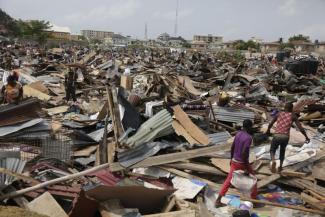Megacity
New islands for the rich
 Alamba/picture-alliance/AP Photo
Many poor people’s homes were demolished in Otodo Gbame.
Alamba/picture-alliance/AP Photo
Many poor people’s homes were demolished in Otodo Gbame.
In many agglomerations around the world, land on river banks and sea shores was historically left to the poor. These plots were at risk of flooding, after all, and they were useful for all sorts of businesses, since the waterways were used for boat and ship traffic. In more recent times, the interest in coastal land has been growing. These areas’ appeal is growing due to less business being done there, less traffic on the water and the ever growing demand for land.
Since the turn of the millennium, the interest in coastal land has increased dramatically in Lagos, Nigeria’s commercial hub. Many beach houses and beach resorts have come up. The most beautiful beaches are reserved for the super-rich. Some private beaches charge visitors fees. They are regularly frequented, and the fees vary according to the quality of the beach and the clientele that goes there. Waterfront houses and estates are fenced off.
Throughout the city’s history, poor people have been evicted so their land could serve more powerful interests. In recent years, poor communities and informal settlements have been affected along the coast and lagoon shoreline. To make space for new developments, communities were forced to leave. Their homes were demolished, and their human rights were violated.
On 9 October 2016, Akinwunmi Ambode, the governor of Lagos State, issued a notice according to which some waterfront communities would have to leave within seven days. He argued that security had to improve in view of kidnappings. Few people doubted that the real issue was land, not security. The regional High Court soon issued an injunction against the notice.
Nonetheless, some 30,000 people lost their homes in Otodo Gbame a few weeks later. Fire was set to some homes and, after some confusion and clashes, the police and a demolition team tore down the informal settlement. The security forces claimed that there had been ethnically motivated agitation, but they did not provide convincing evidence. Amnesty International and UN experts have demanded that the state government investigate the events. Human-rights activists point out that people have a right to a safe home. Recently, Otodo Gbame has come under attack again, rendering 4,700 homeless.
Experience shows, moreover, that forced eviction is no solution. The people concerned have no choice but to occupy other parcels of land. It would make sense to cooperate with the communities and develop liveable spaces. That could happen either where they are or in other parts of the city.
Great ambitions
A long-term strategy has to take local people’s needs into account. So far, they tend to be neglected. At the same time, some ambitious projects are underway that will mostly benefit the better-off. New land is being reclaimed from the Atlantic and from Lagos Lagoon. This has become something of a tradition in Lagos. The first major projects were Dolphin Estate, which was finalised in 1990, and Banana Island, which was completed nine years later. Both are in the Lagoon and now serve as exclusive neighbourhoods for prosperous people.
Currently, Victoria Island is being extended into the Atlantic, and a new neighbourhood called Eko Atlantic City is being built there. Victoria Island is actually no longer an island, but has long become part of Lekki, the long peninsula that separates Lagos Lagoon from the Ocean.
Eko Atlantic City is a controversial project. The authorities want it to become Africa’s first eco-friendly, smart city.
According to the plans, it will be concluded by the end of 2017. The government of Lagos State promises it will provide new homes and improve the living conditions for the growing population of Lagos. Moreover, it is supposed to protect Victoria Island from storm surges. Journalists, however, have written that Eko Atlantic City “heralds climate apartheid” and is set to become “a utopian city for elites only”.
A deep irony of the matter is that no environmental impact assessment (EIA) was presented before work on the project started. Experts have noticed that erosion and flooding have been getting worse along other parts of the urban coast since dredging and landfilling began. Critics had pointed out early on that proceeding without an EIA was irresponsible. Changing coastlines have impacts on aquatic life, moreover, affecting both animals and plants.
In the Lagoon, three new islands are currently being built. The projects were announced in 2016 by the state government and seem to be progressing well. Of course, the water is much calmer in the Lagoon.
It is striking, however, that the expensive developments on all the newly reclaimed sites will only be affordable to at most 20 % of the people. In each case, poor coastal neighbourhoods were destroyed. The state government claims it intends to improve life for the entire population of Lagos, but the real-estate developers’ websites do not mention social or environmental concerns.
Urban planners should take climate change into account moreover. The agglomeration is just starting to grapple with it. The coastal areas are exposed to flooding, erosion and storm surges. For protecting the Atlantic coast, groynes have so far been the preferred option. Groynes are walls that are built out into the sea. They break the force of the waves and thus stem erosion. Last year, 36 billion Nigerian Naira (the equivalent of € 110 million) were earmarked to build 18 groynes along 7.5 kilometres of the coast of Lekki.
It remains to be seen whether the newly reclaimed land will prove viable in the long run. The problem is planners are expanding Lagos out into the sea and lagoon precisely at a time when we know that the sea level is rising.
Olamide Udoma-Ejorh is an urban activist and director of Lagos Urban Network, a non-governmental organisation.
olamide@lagosurbannetwork.com

